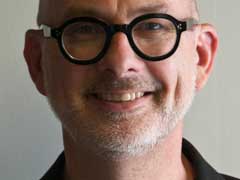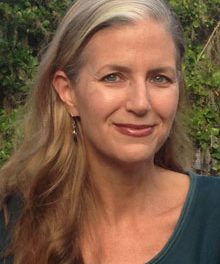But according to architect/author Steve Mouzon, it’s fun!
 With his black tee shirt, black blazer, black-rimmed spectacles and sleek bald head, Steve Mouzon looked exactly as I imagined a “new urbanist” would as he approached the podium at TCL last Wednesday night.
With his black tee shirt, black blazer, black-rimmed spectacles and sleek bald head, Steve Mouzon looked exactly as I imagined a “new urbanist” would as he approached the podium at TCL last Wednesday night.
But then he started talking.
Slightly stunned, I leaned toward my husband and whispered, “Oh my God. I think he’s southern…”
 Let’s face it; despite all our progress, we southerners have an inferiority complex. It’s the flipside of our world-famous pride. We get a secret thrill every time one of our own achieves national status, especially when he does so without losing his drawl or dropping the word “y’all” from his vocabulary.
Let’s face it; despite all our progress, we southerners have an inferiority complex. It’s the flipside of our world-famous pride. We get a secret thrill every time one of our own achieves national status, especially when he does so without losing his drawl or dropping the word “y’all” from his vocabulary.
As it turns out, Steve Mouzon grew up in Huntsville, Alabama, just 20 miles from my own hometown. I discovered this delightful tidbit during an interview at Common Ground the day after his lecture at TCL. Steve and I were joined by Eric Brown, of Brown Design, a member of the Carolinas Chapter of the Congress for the New Urbanism. The CNU, along with several other partner groups, were responsible for bringing Steve to town on September 15th to talk about his new book, “The Original Green: Unlocking the Mystery of True Sustainability”… and the future of Beaufort.
Margaret Evans: Steve, how does a guy who started out as just your basic architect end up a well-known authority on sustainability who writes books and travels the country educating people?
Steve Mouzon: Well, I was always an advocate for sustainability. In college, I was the guy who was always fiddling with things like “cooling tubes” and other gizmos. But it started even earlier, when I was a kid. My mom had this health food store in Huntsville, and she used to bring in these great lecturers…
ME: Were your parents hippies, then?
SM: No, that’s what’s so funny. They were just regular Alabama folks, devout Christians, the most straight-up people you’ve ever met. Mom’s was the only non-countercultural health food store I’ve ever seen! Anyway, she had this series of benches up front, where people would come and sit and talk for hours… to my mom, and each other. And they would literally heal each other. Doctors would send people to my mom and say, “I can’t do anything for this guy, but I know you can.” She was known by thousands as “Huntsville’s Mother Teresa.”
ME: Your description of your mom and her store reminds me of something I really like about the ideas in your book: they’re impossible to politicize. With your emphasis on mining the wisdom of the past – “sustainability our great-grandparents knew by heart” as you say – yours is a “green movement” that everyone can embrace, not just progressives.
SM: It is! I try to tell a story that has broad appeal… that engages both sides of the aisle. Politics, at the very best, only lasts until the next election. The things we’re trying to do last a lot longer than that. If we get tied to a party of any sort, as they go up and down, we go up and down. We’re looking at things that have long-term implications… things that transcend politics.
ME: Hear, hear! Sustainability is an equal-opportunity challenge. At this time when the country is so militantly divided, I loved the fact that I couldn’t tell anything about your personal politics from your lecture last night!
SM: Let’s put it this way – I didn’t even tell my wife who I voted for in the last presidential election until six months later, when she caught me in a moment of weakness…
ME: To broach another touchy subject… I also appreciated the point you made that, “this stuff does not rise to the level of the divine.”
SM: Right! Green is not a religion. Sustainability is not something descended from heaven. It’s just a bunch of humans trying to make stuff work better so our lives can be better.
I’m also adamant that sustainability shouldn’t be a discussion you need a PhD for. It’s simple, it’s common sense, and our ancestors knew it instinctually.”
ME: Well, your book has been very well-received… by those with PhDs and otherwise.
SM: It has. Everybody’s been so nice; nobody’s been brutal at all. It makes me wonder if maybe I did something wrong! Cooter Ramsey (Beaufort architect) asked me, yesterday, if he should heckle me during my lecture last night, and I said ‘YES! I need a good heckler!’
ME: I was seriously inspired by your talk. I came home and told my husband we were going to start spending more time on our back deck, start expanding our “comfort range” so we don’t need so much AC… maybe start biking to work more often.”
SM: “That’s it! There are so many simple things we can all do, and they’re not just good for the environment, but they’re good for us. See, what happened when cars and thermostats came along is that they allowed us to have no discipline. So we got lazy. The same goes for our buildings. Our buildings have been unemployed for about 80 years, so they’ve gotten lazy. They lounge around all day and the machines do all the work. I want to put the buildings back to work!
ME: Your excitement is infectious, Steve. You make this sustainability stuff sound fun…
SM: Well, it is fun. And here’s the thing. If you go to people and tell them, “Your lifestyle is bad; you need to put on your hair shirt,” you’re not going to get anywhere. If you ask people to suffer, they might do it for about two weeks, if you’re lucky. Suffering is not sustainable. I’m trying to tell a story that’s enticing…
It’s a story about building community, first and foremost. And you don’t have to do it all at once. Ease into it. Maybe start with a “gift to the street,” like I mention in the book. Something like a bench or a planting or an awning – something to delight, entertain, give shelter, or give rest. It’s the greatest expression of neighborliness I can think of. You’re doing something nice for someone you may never know.
ME: I love that idea! Moving from the individual to the city level: You’ve said that Beaufort is uniquely positioned to implement the ideas in “The Original Green”… that we have the potential to become a model of sustainability for the rest of the country. Can you elaborate on that?
SM: I have very high hopes that Beaufort will be the town that picks up the gauntlet, because you have several things going for you. First – you’ve got the great beauty of your surroundings. If you want to bring people in from all over the world to show them “how it’s done,” you have a much better chance of luring them to a place like Beaufort than, say, some cornfield in the mid-west. Next, you already have an unusually high proportion of good stuff – with the right patterns – to crappy stuff. You also have a great number of high-level city officials onboard, as well as city planners. (I met with them all yesterday.) And I can think of no other town this size that has as many residents who, like Eric here, also happen to be leaders in the new urbanism movement. Per capita, Beaufort is by far the world capital of new urbanism!
ME: Eric, can you tell me why you and your partners brought Steve Mouzon to speak, not only to city planners, but to residents? What are you hoping to accomplish?
Eric Brown: There’s a large group of us in town, under a variety of banners, who are trying to make sure that Beaufort has the tools we need to grow properly. What does that mean? Well, we’re talking about a community here, so everything that makes up a community is everything we need. It’s not just about building. It’s about agriculture, it’s about the arts, it’s about business. It all works hand in hand.
Beaufort is this awesome, unique place in the world. It’s got its own distinct architecture, its own distinct interaction with nature, its own distinct urbanism. People love to live here. But the way we’ve been growing has taken away from that. Now, you can’t stop growth, and we don’t want to. Beaufort is going to grow. But the question is: How? We can grow into, say, the bad part of Atlanta… or we can do it right. We can grow into the next generation of Beaufort. But we all have to figure out what that means. So, basically, we’re trying to raise the level of the collective discussion.
ME: Just one more question for you both. Why should Beaufort seek to become a “model of sustainability”? What’s in it for us?
SM: Well, first of all, a great, sustainable community is its own reward.
EB: And as Steve says, we’re uniquely positioned. It’s all here. We’ve got the tools. We’ve got the know-how. We’ve got the good bones.
SM: Bottom line: This is a problem the whole country is facing as we move into the future. America needs Beaufort to get this right. Think about it – you’ve got a chance to help the entire country just by living well!
Read more about Steve Mouzon, “The Original Green,” and Beaufort here.





